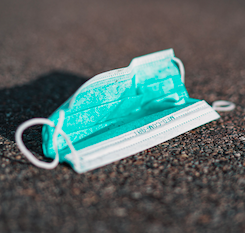Policing in Romania during COVID-19
|
Romania is a large country at the crossroads of Central and Eastern Europe. Its capital and largest city is Bucharest. The majority of Romanians are ethnically Romanian, with significant Hungarian and Romani minorities. Romania is a member of NATO as of 2004 and the EU as of 2007, but has struggled with corruption and poverty since the 1989 Romanian Revolution.
Romania confirmed its first case of coronavirus on February 25, 2020, and declared a state of a emergency on March 16, 2020. Sweeping lockdown measures were announced March 25, 2020, with steep fines and potential prison sentences for those caught violating lockdown orders. As in many European countries, the Romanian government required the use of a self-declaration form whenever leaving the home. The police quickly began abusing the circumstances, with over 90 million euros ($140 million CAD) in fines handed out in the first month of the lockdown. Offences resulting in steep fines included an elderly man going to the shops outside of the hours of 11am to 1pm; a mayor who was fined after video emerged of him riding a bicycle in a park with his girlfriend; another man who was fined 400 euros ($620 CAD) for going to the carwash, despite having the appropriate declaration form; and another man who was fined 4000 euros ($6200 CAD) for going to a shop without a declaration form. In a country with average wages totalling less than 450 euros ($700 CAD) per month, these fines are out of the reach of the majority of Romanians.
A major struggle for Romania in its post-1989 transition from Communism has been the prison system. Romania's infamously austere and overcrowded prison system has faced added strain since the outbreak of COVID-19. While many countries opted to release large numbers of inmates to reduce crowding in the face of COVID-19, Romania maintained its prison population while reducing visiting opportunities. Early in the pandemic, prisoners at the Satu Mare prison in northwestern Romania rioted to protest lockdown restrictions and worsening conditions. Inmates set fire to their mattresses in desperation. Three inmates were killed, and a further two were seriously injured, in the resulting fire. The pandemic has worsened an already dire situation in a country with famously harsh and overcrowded prison conditions.
In addition to steep fines and tough prison conditions, Romania has seen a number of incidents of violence and other abuses of power by police, the gendarmerie, and border patrol officers. In one widely publicized incident, a police officer was filmed repeatedly punching one or two individuals who were out past the allowed curfew without proper documentation.
An unfortunate reality of COVID-19 has been heightened pressure on marginalized communities. In Romania, some of the most heavily marginalized populations include ethnic minorities such as Roma, also known as Romani people (despite the nominal similarity, Romani people are not of Romanian ethnic origin). Roma in Romania and across Europe face high levels of poverty, racism, and abuse by police even in regular times; the COVID-19 pandemic has exacerbated issues facing the Romani community. Some European countries have gone as far as enforcing militarized quarantines of Roma-majority communities.
Within Romania, the pandemic has highlighted the violent subjugation of Roma. Stereotypes of Roma being "unclean" have spread unchecked, leading people to violent rhetoric that goes as far as to sympathize with Nazi aims of exterminating Roma. Since the sweeping lockdown measures announced in Romania, Roma have been subjected to violence at the hands of police including beatings, whippings, and more. Video evidence and oral testimony describe men being handcuffed on the ground while multiple police, including the chief of police of the area, beat them and whip the bare soles of their feet, shouting vulgarities and slurs. Others describe arrests of families with children as young as 6 years old for such "crimes" as leaving their homes for firewood; those arrested were then forced to stand outside in the cold for several hours, urinate on the street and drink from a hose when thirsty. Far from being a phenomenon relegated to the early, panic-stricken days of the pandemic this, is an ongoing trend — indeed, as recently as November 2020, a Romani man was shot by Romanian police.
The injustices committed by police in the name of the pandemic cannot be ignored. It is imperative that historians present and future do not allow global crises to excuse brutality on behalf of the state.
|
|
NEXT PAGE: POLICE BRUTALITY IN RUSSIA

